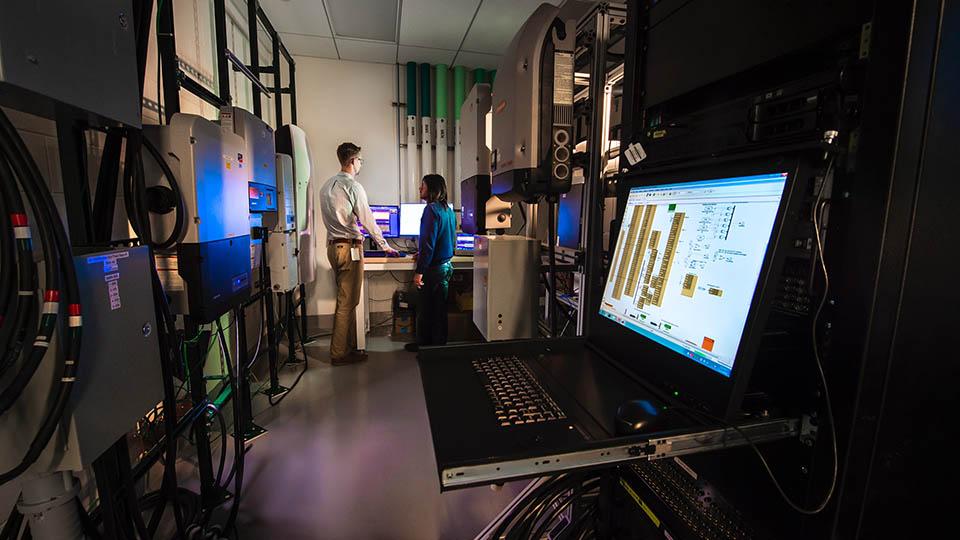
Innovation and user experience
summary
The sociotechnical research group for innovation and user experience aims to support the design and development of systems that meet all the needs of end-users globally. We focus on the international and sociotechnical design of interactive systems.
About the project
Our research sets out to increase knowledge of cultural differences in the process and product of the design of interactive systems. In doing this, there are two challenges that need to be addressed:
1. Computer science and interdisciplinary challenges that need to be addressed in order to provide tools, techniques and methods that can be used by technology developers and interaction designers.
We research the differing nature of these challenges in both the commercial and international development domains.
2. Institutional and governmental challenges to overcome resistance to change so that new tools, techniques and methods are actually implemented commercially.
Implicit here is the requirement to collaborate with academics and practitioners internationally, both in promoting human-computer interaction, user experience and usability generally and localising the discipline itself, particularly in developing countries.
About the group
The sociotechnical research group for innovation and user experience was founded by the late Professor Andy Smith, who led a team of researchers working in Europe, Africa and Asia. Andy’s work left an important legacy in this field, which currently underpins much of the work we do.
The group currently engages in different types of activities spanning research, consultancy and training.
Through our lab and network of members and associates, we offer world-class expertise in several areas including but not limited to:
- user experience and usability consultancy
- cross-cultural and sociotechnical design of interactive systems
- work analysis and interaction design
- cultural and sociotechnical aspects of user experience
- cultural and sociotechnical aspects of software engineering
- technology-mediated intercultural collaboration
- human-computer interaction in developing countries (HCI4D)
- cultural and sociotechnical aspects of HCI education.
We have been successful in exploiting UK and EU funding streams in delivering its research strategy. We have accessed the EU Asia IT&C programme to support usability research in both India and China. We have been the lead partner in the Sino European Systems Usability Network (SESUN) and the Indo European Systems Usability Partnership. SESUN has developed active and sustainable links between China and Europe, helping to redefine and promote HCI / usability within China. This has included collaborating with the Ministry for Information Industry, co-chairing a major conference in Beijing.
We were also involved in the EPSRC funded VeSeL project - Village e-science for Life – which addressed the problems associated with the digital divide in Africa. VeSeL aims to fuse educational and environmental objectives to empower African village communities. Our contribution there focused on socio-technical participatory design and the localization of usability methods.
More recently, SCIUX has begun to explore the use of emerging copyleft hardware technologies and how they might contribute to the fields of mobile learning and information communication technology for development (ICT4D). We believe that this open approach provides the opportunity for the community to directly influence the hardware roadmap of a device and thus generate sustainable solutions within markets of developing countries.
Also in the e-learning domain, we are looking at university libraries’ usability design from a socio-technical perspective.
Our work with commercial usability agencies and clients such as Microsoft, HSBC, Siemens and Intercontinental has allowed us to develop a process model for developing usable cross-cultural websites. A current commercial focus of our research is on how different perceptions of internationalisation lead to issues in its integration with software development methods such as Agile.
The impact of context and culture poses many challenges that cannot be exposed as a one-off evaluation in technology design. Decisions and actions in product design often result in the emergence of cultural and sociotechnical implications and issues. Our research is aimed at the early identification of these to promote enhanced stakeholder participation and better product usability and user experience.
Research projects
-
Research projects in progress
- sociotechnical design of mobile application for patients on anticoagulant therapy
- identifying sociotechnical gaps in online collaborative consumption
- user experience research in non-WEIRD (Western Educated Industrialised Rich Democratic) contexts and users
- software localisation within agile development processes
- HCI Education and culture: exploring cognitive styles of students and professionals in order to inform the curriculum taught in universities.
- library usability, library experience and user satisfaction in higher education: a case study of the changing paradigm and its contemporary context
- individual learning styles, user acceptance, and the use of technology: investigating the relationship between usability and individual learning styles
- mobile computing in developing countries
- ICT development for SMEs in Ethiopia.
-
Research projects that have been completed and awarded in the last few years
- quality in global software development: analysing differences across culture
- text to speech technology: usability in multicultural environments as a teaching and learning tool
- a usable framework towards enabling ICT in rural sub-Saharan Africa
- the role of culture in usability evaluation: collectivistic and individualistic users compared
- institutionalising HCI in India and China.
Group members
- Professor José Abdelnour-Nocera is Head of the Sociotechnical Research Group for Innovation and User Experience
- Dr Malte Ressin is a lecturer at the School of Computing and Engineering
- Dr Ali Gheitasy is a lecturer in computing
- Professor Dimitrios Rigas is Professor of Business Interactive Systems and Creative Technologies
The SCIUX lab
The SCIUX lab supports our work in user-centred design, user experience and user behavioural studies.
The lab is also available for hire.
Our lab services include (but are not limited to):
- user testing
- eye tracking
- focus groups
- information architecture.
Our rooms are equipped to support collaboration between clients, designers and users working together to explore, elicit and validate requirements. This is accomplished through:
- card sorting
- wireframing
- prototyping.
The SCIUX lab features:
- the usability room (which facilitates user testing to observe and obtain data from users interacting with different types of desktop and mobile applications)
- the focus group rooms
- a refreshment area for participants and clients.
Ali Gheitasy is the Lab Coordinator.
email: ali.gheitasy@uwl.ac.uk
Address:
Room A400
University of West London
St Mary’s Road
Ealing
London
W5 5RF
Selected publications
-
2013
Camara, S. Abdelnour-Nocera, J. (2013). Revealing the Socio-Technical Context of Design Settings: towards participatory IS design. International Journal of HCI. (Accepted)
-
2012
Abdelnour-Nocera, J., Sharp, H. (2012) Understanding Conflicts in Agile Through Technological Frames. International Journal of Sociotechnology and Knowledge Development. 4(2), 29-45, April-June 2012
Smith, A., 2011. Global Usability. In Human-Computer Interaction Series. Springer London, pp. 23–38. Available at: https://www.springer.com/gp/book/9780857293039.
Abdelnour-Nocera, J. et al., 2012. An intercultural study of HCI education experience and representation. In international conference on Intercultural Collaboration. ACM Press, p. 157.
-
2011
Ressin, M., Abdelnour-Nocera, J., Smith, A. (2011) Of Code and Context: Collaboration Between Developers and Translators in Proceedings of CHASE 2011 at ICSE.
Lee, D., Smith, A. and Mortimer, M. (2011) Cultural differences affecting quality and productivity in Western / Asian offshore software development, in Proceedings of India HCI 2011.
-
2010
Camara, S.B., Shrestha, S., Abdelnour-Nocera, J., Moore, J. “Village eLearning: An offline mobile solution to rural communities’ knowledge requirement”, BCS Conference on Human Computer Interaction (HCI2010), September 2010, Dundee, Scotland
-
2009
Camara, S., Oyugi, C, Abdelnour-Nocera, J. and Smith, A.: Augmenting Usability: Cultural elicitation in HCI, in Human Work Interaction Design: Usability in Social, Cultural and Organizational Contexts, Second IFIP WG 13.6 Conference HWID 2009, Springer pp. 46-56) (2009)
Dunckley, L., Camara, S., Abdelnour-Nocera, J. and Waema, T. (2009) Socio-Technical Issues of Participatory Design in the Developing World. International Journal of Sociotechnology and Knowledge Development.1(3): 1-14
-
2008
Abdelnour-Nocera, J. and Dunckley, L. (2008) Sociotechnical Research In Community-Centred Systems Design: A Technological Frames Perspective. International Journal of Web Based Communities. Vol. 4, No.4 pp. 476 – 490
-
2007
Smith, A. Joshi, A. Liu, Z. Bannon, L. Gulliksen. J. and Li, C: Institutionalising HCI in Asia, in Human-Computer Interaction – INTERACT 2007, LNCS, Volume 4663/2009, Springer, pp 85-9 (2007)
Abdelnour-Nocera, J., Dunckley, L. and Sharp, H. (2007), An Approach to the Evaluation of Usefulness as a Social Construct using Technological Frames. International Journal of Human-Computer Interaction, Special Issue about Field Research Methods. 22, 1-2, pp. 153-172.#
-
2004
Smith, A., Dunckley, L., French, T., Minocha, S. & Chang, Y.: A process model for developing usable cross-cultural websites. Interacting with Computers, 16, 63-91. (2004)
Training
We offer different levels of qualifications and training in the field of user experience and interaction design. These include:
PhD programmes
Our expertise and qualifications enable us to support PhD students in any topic related to our group (See About Page). These include user experience and culture, sociotechnical design, Participatory Design, Mobile HCI, ICT4D, among many others.
Short courses and training
We offer a vibrant and innovative short courses programme for practitioners and people coming from industry with an interest in any aspect of user experience. These have included:
- Fundamentals of User Research
- Introduction to Service Design
- Introduction to Information Architecture
- User Experience and Internationalisation
Please email Dr José Abdelnour Nocera jose.abdelnour-nocera@uwl.ac.uk for more information.
Contact us
Dr José Abdelnour Nocera
- School: School of Computing and Engineering
- Address: Room A400, University of West London, London, W5 5RF, UK
- Email: Jose.Abdelnour-Nocera@uwl.ac.uk
- Tel: 020 8231 0251
Find out more about research degrees with the School of Computing and Engineering
Find out more
-
Research Centres and Groups
Find out about our multi-disciplinary areas of expertise, PhD research, and teaching.
-
Research impact
Learn how our PhD research has helped communities locally, nationally and internationally.
-
The Graduate School
If you are interested in studying for a PhD or Professional Doctorate, the Graduate School is here to support your research.





